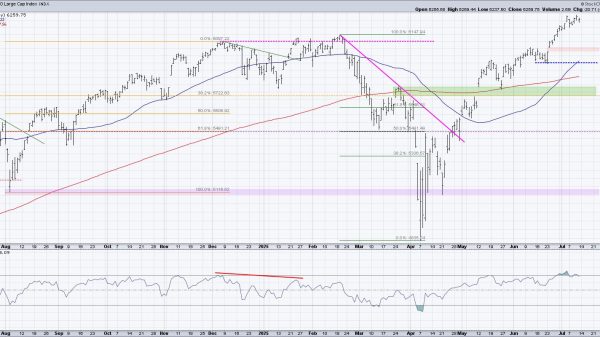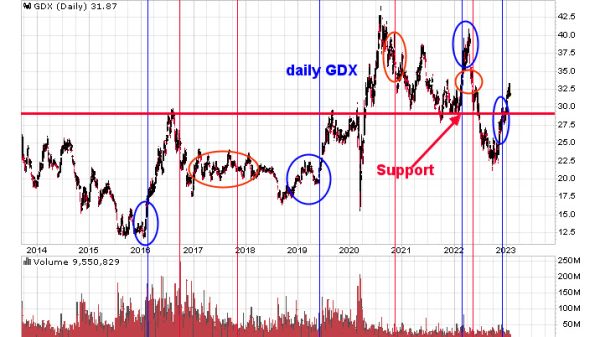House Republicans surprised plenty of observers Wednesday by helping deliver an overwhelming victory for House Speaker Kevin McCarthy’s debt ceiling deal with President Biden. They voted for the package more than 2-to-1, despite strong criticisms of the deal from the right wing of the party, which complained that its spending restraints were wholly insufficient.
But after the Senate also voted to sign off on the deal Thursday, McCarthy’s (R-Calif.) win is looking even bigger.
While the House passed the bill by nearly 200 votes — 314 to 117 — the Senate vote was closer, 63-36. And most notably, while 68 percent of House Republicans voted for it, just 35 percent of Senate Republicans did. While the House GOP was 2-to-1 in favor, the Senate was nearly 2-to-1 against.
The reasons for that are varied, but it’s evident that McCarthy was able to deliver a statement vote in the face of right-wing resistance in the House.
And five months after a knockdown, drag-out battle with the Freedom Caucus to secure the gavel, that augurs well for what is still likely to be an arduous speakership.
Some of the Senate GOP criticism of the bill was less that it didn’t cut enough and more that it restricted spending too much — on defense, specifically. Sen. Lindsey O. Graham (R-S.C.) led the charge on fighting to assure the caps could be worked around, and several other Republican “no” votes, including Sens. Dan Sullivan (R-Alaska), Roger Wicker (R-Miss.) and Tom Cotton (R-Ark.), suggested this was the biggest factor in their vote. (Others, like Tennessee Sen. Marsha Blackburn and Louisiana Sen. Bill Cassidy, also mentioned defense as at least a factor.)
“The pending debt ceiling agreement does not do enough to address our rising debt,” Wicker said. “Even worse, this agreement would enact President Biden’s woefully inadequate defense budget for the next two years.”
There was also less pressure on these Senate Republicans to vote for the deal, because the Democratic votes were overwhelming. While 46 House Democrats (22 percent) voted no, just five Senate Democrats followed suit (10 percent).
But it’s also clear that McCarthy was able to wring many more votes out of Republicans who might have been skeptical and didn’t want to or even need to vote for the bill.
Senate votes on such things are usually more decisive. That’s because House members tend more toward the political extremes; there are simply more Freedom Caucus types and “Squad” types to contend with if you’re a leader. That’s not always the case, but there’s a reason the Senate is often referred to as the saucer that cools the hot tea sent over by the House.
And the handful of complaints about defense spending — Senate Republicans tend to be more hawkish — simply don’t account for the difference. Were House Republicans to have voted for the deal at the same rate as Senate Republicans, you would have seen 78 House Republican “yes” votes rather than 149. Only 51 House Republicans were ultimately needed to pass the bill, meaning McCarthy beat that number by nearly a hundred votes.
As the votes were coming together, it became clear that even Freedom Caucus types were somewhat reluctant to criticize McCarthy for the deal he had cut. Part of that could be understood as not wanting to go to war with him (yet), but another way to understand it is they knew McCarthy still had the loyalty of his conference and that such a war would be a losing effort.
And if you look at how Senate Republicans explained their “no” votes, you’ll see that they have also made pains to argue that this was not a rebuke of McCarthy.
“I applaud Speaker McCarthy,” Sullivan began his statement.
“Speaker McCarthy and House Republicans did an extraordinary job of getting President Biden to the table, and I thank them for their hard work,” said Sen. John Neely Kennedy (R-La.).
“I don’t blame Speaker McCarthy,” said Sen. Roger Marshall (R-Kan.).“I think he negotiated the best he could.”
Wicker said McCarthy “deserves recognition,” while Blackburn said, “I commend Speaker McCarthy.”
In other words: You did your best, and good job, even if your best was a bad deal that I cannot vote for.
That argument would be a more difficult circle to square in the House, where Republicans know that McCarthy’s hold over the conference is tenuous, and the votes could reflect more directly upon him. And those House Republicans commended him in the more traditional way: by giving him a strong vote total he can rightfully point to as a sign of his current political strength. That vote total looks even stronger now.





























